Gas water heaters are popular because they are efficient and easy to use. Then again, not all heaters are the same. So what sets apart the best gas water heater from the rest?
Quality gas water heaters have high-grade components that allow the heater to perform for longer periods. The controls are also easy to use, and they do not use up a lot of energy to heat water.
- Takagi T-KJr2-IN-NG Natural Gas Water Heater
- Takagi T-H3-DV-N Natural Gas Water Heater
- Rheem RTG-64XLN Natural Gas Water Heater
- Rheem RTG-64DVLN Prestige Natural Gas Water Heater
- Rinnai RUC98iN Natural Gas Water Heater
- Rinnai RL75iN Natural Gas Water Heater
- Eccotemp FVI-12-LP Natural Gas Water Heater
- Camplux 10L Outdoor Gas Water Heater
- Westinghouse WGRTNG199 Natural Gas Water Heater
- Noritz EZTR40-NG Natural Gas Water Heater
Gas Water Heater Reviews
Takagi T-KJr2-IN-NG Natural Gas Water Heater
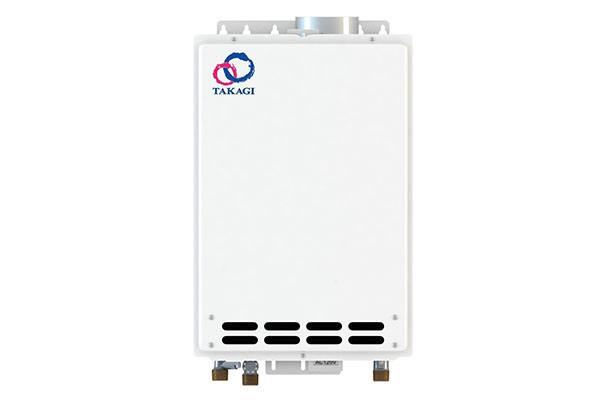
Takagi T-KJr2-IN-NG can deliver up to 140,000 BTU input per hour and a max 6.6 GPM flow rate, making it ideal for small homes with one to two bathrooms. It has outlet and inlet thermistors and safety features like the flame sensor and overheat cutoff fuse.
>>>> Click Here To See Customer Reviews & Current Price <<<<
Takagi T-H3-DV-N Natural Gas Water Heater
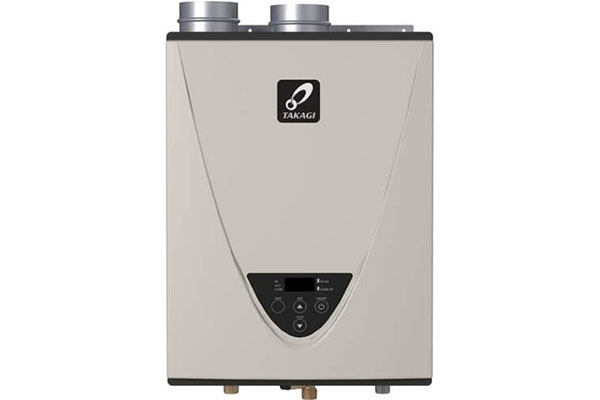
Ideal for long-term heating purposes, Takagi T-H3-DV-N boasts of a 10-gallon per minute flow rate. It features a condensing system, so you no longer need fancy vents. It has low NOx emissions and delivers a 199,000-BTU gas input.
>>>> Click Here To See Customer Reviews & Current Price <<<<
Rheem RTG-64XLN Natural Gas Water Heater
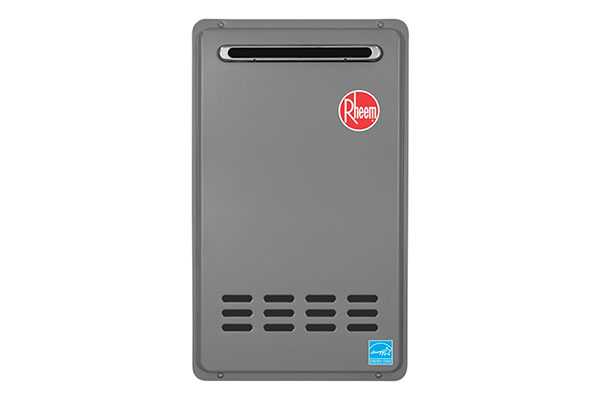
The 6.4 GPM flow rate of Rheem RTG-64XLN makes it capable of handling multiple sinks and showers simultaneously. It is reported to have low NOx, which decreases harmful emissions. It only weighs 54 pounds, so moving it from one place to another is easier.
>>>> Click Here To See Customer Reviews & Current Price <<<<
Rheem RTG-64DVLN Prestige Natural Gas Water Heater

Mainly designed for indoor use, Rheem RTG-64DVLN Prestige works for residential water heating. It has Ultra-low NOx, condensing heat exchanger and smart electronic controls. It delivers a 6.5 GPM output, so it works well for one to two bathroom applications.
>>>> Click Here To See Customer Reviews & Current Price <<<<
Rinnai RUC98iN Natural Gas Water Heater
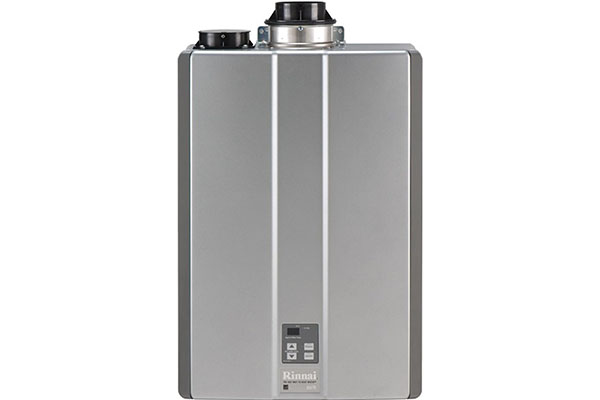
Rinnai RUC98iN works for both commercial and residential applications. It utilizes natural gas or propane with several venting options. It adheres to nitrogen oxide emission standards, and has a compact design, digital display and gas control and water temperature buttons.
>>>> Click Here To See Customer Reviews & Current Price <<<<
Rinnai RL75iN Natural Gas Water Heater
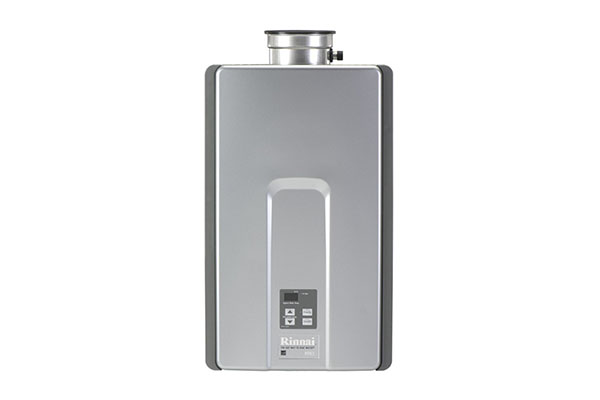
With its sleek and contemporary design, Rinnai RL75in can fit into any available space. It has a silver finish and sculpted cover. It is energy-efficient, has several advanced features including digital controller, and processes up to 7.5 GPM flow rate.
>>>> Click Here To See Customer Reviews & Current Price <<<<
Eccotemp FVI-12-LP Natural Gas Water Heater
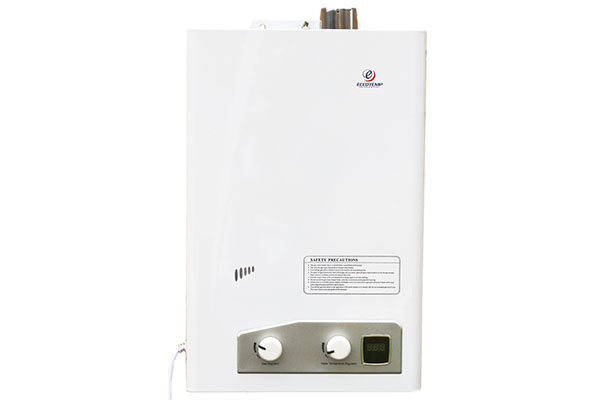
Eccotemp FVI-12-LP works well for smaller homes, cottages and vacation cabins. It features a horizontal vent kit made of stainless steel, digital temperature display featuring fully independent water and gas controls, and 2.3 GPM water flow rate.
>>>> Click Here To See Customer Reviews & Current Price <<<<
Camplux 10L Outdoor Gas Water Heater
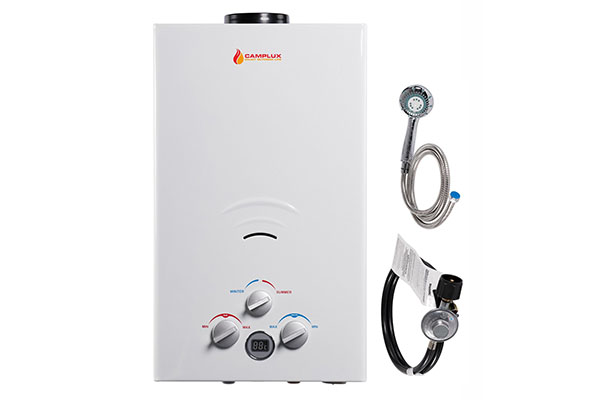
Camplux 10L gas water heater is ideal for outdoor use. It can deliver a max power output of 68,000 BTU per hour. It features innovative combustion technology, 12-volt water pump, digital display, 2.64 GPM flow rate and winter or summer type conversion function.
>>>> Click Here To See Customer Reviews & Current Price <<<<
Westinghouse WGRTNG199 Natural Gas Water Heater
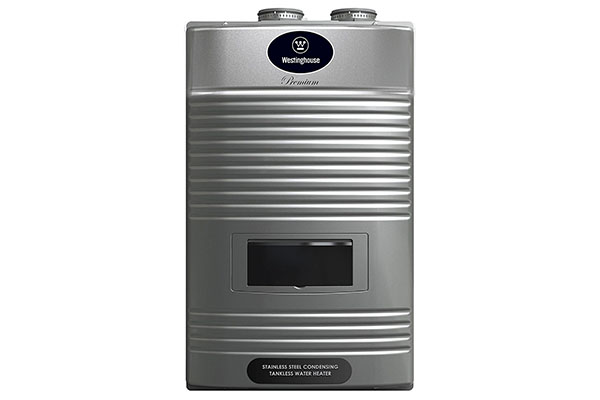
Westinghouse WGRTNG199 is known for its ability to deliver a highly efficient heating experience. It features a heat exchanger made of corrosion resistant and durable stainless steel. It has advanced temperature controls, Energy Star certification, and innovative gas leak detector.
>>>> Click Here To See Customer Reviews & Current Price <<<<
Noritz EZTR40-NG Natural Gas Water Heater
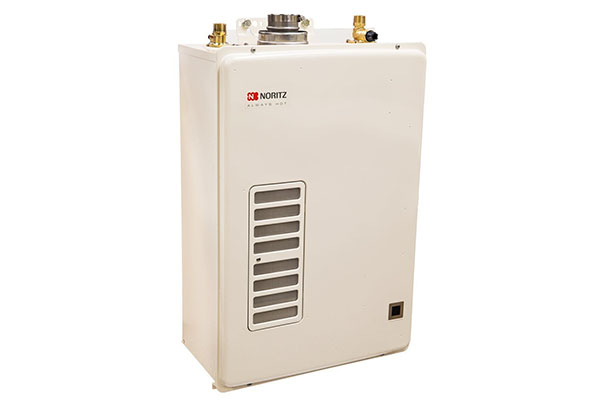
Noritz EZTR40-NG is designed in such a way that you can convert the 30/40 gallon water heater into the tankless type. It features a flow sensor, heat exchanger, 6.6 GPM and highly efficient condensing technology. It also has an isolation valve kit to service and descale the heater when necessary.
>>> Click Here To See Customer Reviews & Current Price <<<<
Types Of Gas Water Heaters
Storage Tank: Among the types of water heaters, this has the simplest design. Water is stored in the tank where it is heated, and then reheated if necessary.
Most manufacturers equip storage tank water heaters with a thermostat to control the water’s temperature. Tank sizes range from 113 to 378 liters to suit the varying demands of buyers.
Tankless Water Heater: This type heats water only when the tap is turned on, enabling it to give a continuous and unlimited supply of hot water.
Since it doesn’t make use of a tank, it can be installed almost anywhere in the house. And apart from being a space-saver, this type of gas water heater is energy-efficient.
Combination Boilers: Those in need of a water and home heater will benefit from this installation. Combination boilers heat water then pump it through the pipes running across the floor to heat your home.
These boilers don’t need furnaces, making them both cost-efficient and space-saving. They heat water with the use of either tankless water heaters or storage tanks.
How To Select a Gas Water Heater
Determine the size you need: Apart from knowing how much space you can allot for the water heater, you need to know how much hot water you’ll be using o a daily basis.
The easiest way to do that is by estimating your GPD (gallon per day) consumption, limiting your measurements only on activities and appliances that uses hot water.
Consider water consumption limitations: If you use hot water only on selected water outlets, gas-powered tankless water heaters may suit your needs better. These cost more, but are more energy efficient than storage tanks.
If, however, you want to control the consumption of hot water, the limits storage tanks carry will greatly serve your purpose.
Know the gas used in your house: The two most common gas connections are natural gas and liquid propane (LP). Because their properties are entirely different, manufacturers have to develop gas water heaters specifically for one or the other.
This means before you buy one, make sure it’s compatible with your gas connection. Because otherwise, you’d be left with no choice but to undo the installation, and spend more than you intend.
How To Maintain Your Gas Water Heater
Tap water carries millions of microscopic solids, chemicals and microorganisms. And should these not find their way through faucets and showerheads, they will build up in your water heater.
Draining the storage tank is the only way to get rid of these build ups because they settle at the bottom. Cleanups should be done annually, or as frequent as necessary depending on your water’s TDS (total dissolved solids) levels.
The unit should provide instructions on how to accomplish the job. Different manufacturers and different types of water heaters, after all, may list unique procedures.
Also, oxygen is an important component in burning gas, so the water heater would need ample supplies of it. A lack of it may cause damages to the burner chamber, and thus result to carbon monoxide leaks. This means you have to clear the unit’s surrounding to keep the room oxygen-rich.
Don’t forget as well to check for leakages. The worst it can do is help rust develop, but it will cost you a fortune in wasted energy and water.
How Gas Water Heaters Work
Both gas and electric water heaters work the same, no matter which type you go for. Where they differ is the need of the former for ventilation.
Storage tanks are cylindrical in shape, with the heater located at the bottom. Before any gas is released to make the heater work, the tank is filled with regular tap water.
Because cold water goes down, and hot water goes up, the heater gets to evenly heat the water. And because of the thermostat these are commonly equipped with, the water is heated to your needs.
Tankless water heaters, or on-demand types, don’t come with giant cylinders because they heat tap water instantly. These have what’s called copper heat exchangers and water only need to pass through them to get heated.
The by-product of these processes are called combustion gases and these need to exit through dedicated sealed vents.
If your home doesn’t have the required ventilation system, it is inevitable that you’d need one installed along with your gas water heater.